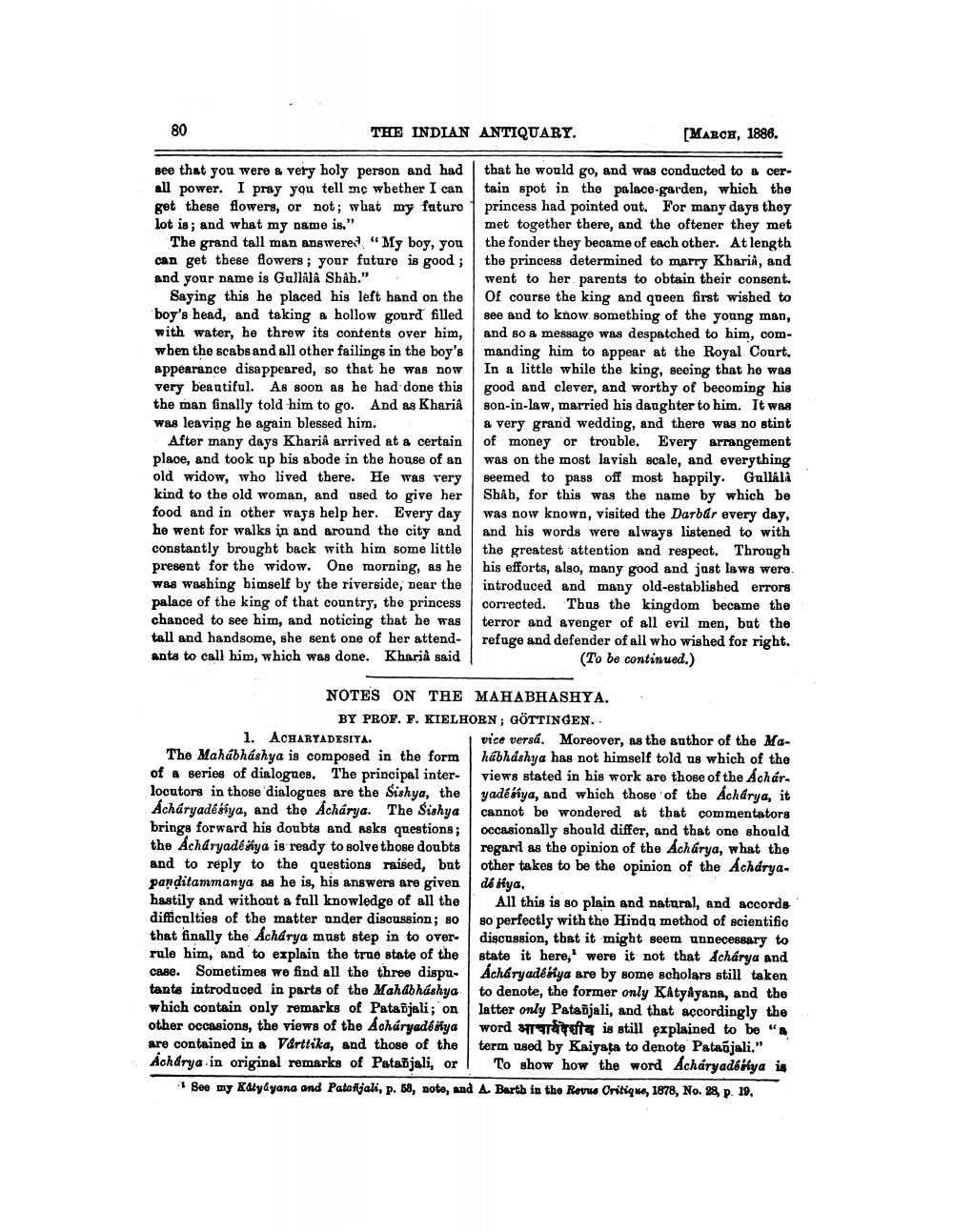________________
80
THE INDIAN ANTIQUARY.
[MARCH, 1886.
Bee that you were a very holy person and had that he would go, and was conducted to a cerall power. I pray you tell me wbether I can tain spot in the palace-garden, which the got these flowers, or not; what my fature 1 princess had pointed out. For many days they lot is; and what my name is."
met together there, and the oftener they met The grand tall man answered "My boy, you the fonder they became of each other. At length can get these flowers; your future is good; the princess determined to marry Kharia, and and your name is Gullala Shih."
went to her parents to obtain their consent. Saying this he placed his left hand on the Of course the king and queen first wished to boy's head, and taking a hollow gourd filled see and to know something of the young man, with water, he threw its contents over him, and so a message was despatched to him, comwhen the scabs and all other failings in the boy's manding him to appear at the Royal Court, appearance disappeared, so that he was now In a little while the king, seeing that he was very beautiful. As soon as he had done this good and clever, and worthy of becoming his the man finally told him to go. And as Khariâ son-in-law, married his daughter to him. It was was leaving he again blessed him.
a very grand wedding, and there was no stint After many days Khariâ arrived at & certain of money or trouble. Every arrangement place, and took up his abode in the house of an was on the most lavish scale, and everything old widow, who lived there. He was very seemed to pass off most happily. Gullala kind to the old woman, and used to give her Shåb, for this was the name by which be food and in other ways help her. Every day was now known, visited the Darbar every day, he went for walks in and around the city and and his words were always listened to with constantly brought back with him some little the greatest attention and respect. Through present for the widow. One morning, as he his efforts, also, many good and just laws were Was washing himself by the riverside, Dear the introduced and many old-established errors palace of the king of that country, the princess corrected. Thus the kingdom became the chanced to see him, and noticing that he was terror and avenger of all evil men, but the tall and handsome, she sent one of her attend- refuge and defender of all who wished for right. ants to call him, which was done. Kharià said
(To be continued.)
NOTES ON THE MAHABHASHYA.
BY PROF. F. KIELHORN; GÖTTINGEN.. 1. ACHARYADESIYA.
| vice versá. Moreover, as the author of the MaThe Mahábháshya is composed in the form hábhdshya has not himself told us which of the of a series of dialogues. The principal inter- views stated in his work are those of the Achár. locutors in those dialogues are the Sishya, the yadésiya, and which those of the Acharya, it Acharyadésiya, and the Acharya. The Sishya cannot be wondered at that commentators brings forward his doubts and asks questions; occasionally should differ, and that one should the Acharyade öya is ready to solve those doubts regard as the opinion of the Acharya, what the and to reply to the questions raised, but other takes to be the opinion of the Achdrya. panditammanya as he is, his answers are given de fiya, hastily and withont a fall knowledge of all the All this is so plain and natural, and accords difficulties of the matter under discussion; so so perfectly with the Hindu method of scientific that finally the Acharya must step in to over- discussion, that it might seem unnecessary to rule him, and to explain the true state of the state it here,' were it not that Acharya and case. Sometimes we find all the three dispu- Acharyadébiya are by some scholars still taken tants introduced in parts of the Mahabháshya to denote, the former only Katyayana, and the which contain only remarks of Patañjali; on latter only Patañjali, and that accordingly the other occasions, the views of the Acháryadémiya word sortate is still explained to be "* are contained in a Vårttika, and those of the term used by Kaiyata to denoto Patañjali," Acharya in original remarks of Patañjali, or to show how the word Acharyadófiya is
see my Katyayana and Pataftjali, p. 58, note, and A. Barth in the Rovus Critique, 1878, No. 28, p. 19,




